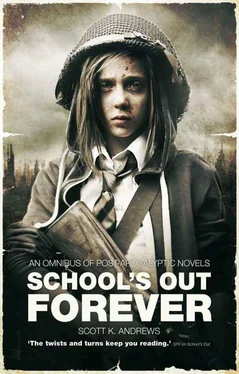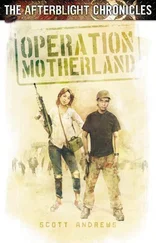“Our orders are to disarm everyone, Kate.”
“It’s Jane, and those are stupid orders. Obviously these cleaners came to town, found the people here defenceless and either drove them out of their homes or massacred them. And that’s your fault. If they’d been armed, they’d have been able to defend themselves.”
Sanders put down his bowl and stood up suddenly. “Time to ship out,” he said brusquely, and he left the room.
KATE WAS ALWAYS a good girl at school. She studied hard, got good grades, excelled at science, biology especially, and made her parents proud.
She only got in trouble once, and that wasn’t her fault. Her friend April had started a fight — she never really understood what about — and Kate had tried to break it up. But in the struggle to keep the peace she ended up getting thumped, hard, by a nasty little bitch called Mandy Jennings. So Kate thumped her back — the first and only time she ever threw a punch. Well, until Moss Side. Unfortunately, her aim was true and Mandy wore glasses. So when the screaming and hair pulling finally ended, Kate was marched off to see the headmaster, who gave her all that guff about letting herself down. And Kate bought it, ’cause she was a good girl, and she felt ashamed and she cried and said, “Sorry, Sir.”
As Sanders drove the truck through the gates of Salisbury HQ I felt an echo of what Kate had felt when she was about to be brought up before a figure of authority — a sick, hollow, butterfly ache in the stomach. The only difference was that Jane would have told the headmaster to go stuff himself. And the headmaster was unlikely to have Kate lined up in front of a firing squad.
Salisbury had been the centre of British Army maneouvres for decades, and all the facilities had recently been given a 21 stcentury facelift, so the main base at Tidworth was modern and sprawling, with barracks aplenty and facilities for the maintenance of all sorts of vehicles. But there was so much stuff gathered here that it had spilled out of the base perimeter and on to the plain itself. Row upon row of trucks, tanks, armoured vehicles, jeeps, fire engines, both Green Goddesses and the conventional red ones, ambulances and police vans. Not to mention the hundreds of oil tankers, lined up in rows stretching off to the horizon.
Sanders had undersold the operation’s ambitions. They weren’t just hoarding weapons, they were collecting all the resources they could lay their hands on. After all, resources meant power. If they had all the service vehicles and all the fuel, married to a well drilled force in possession of weaponry vastly superior to anything else out there, they would be unstoppable.
As I looked out of the truck window and saw all that hardware I felt both excited and scared. All that power, just waiting for someone to give the order to move from preparation to implementation. Operation Motherland was a sleeping giant. When it awoke nothing and nobody would be able to stand in its way.
We drove past a parade ground where at least 400 men were doing drills, and groups of soldiers in full kit marched past us at regular intervals, heading for trucks or armoured vehicles, off to round up more guns, fuel, Pot Noodles or whatever. The place was buzzing, full of organised, purposeful activity.
So as we drove into that awe inspiring place I felt insignificant and afraid, and I wondered what the headmaster would be like. Because with all this at his command, he could do pretty much anything he wanted with me.
Sanders pulled up outside the medical centre and carried Caroline inside. We’d made her a little bed in the back and Rowles had sat with her during the journey. He’d not said a word to me since she’d been shot. I think he blamed me for letting it happen, and an angry Rowles was not someone I wanted to confront, so I left him alone to brood. Caroline herself was conscious and cogent, but complaining of sharp pains in her head, which worried me. There was a possibility that she was bleeding into her skull, and I wanted her x-rayed as quickly as possible. I let Sanders sort out the formalities and I sat in the truck feeling guilty, useless and scared.
I caught myself wishing Lee were here, but I banished that thought as quickly as it appeared.
Sanders emerged five minutes later and opened the cab door for me, indicating that I should get out.
“They think she’ll be fine, but they’re going to give her a full work up. Rowles is staying with her,” he said as I clambered down. There was an awkward moment as he put his hands around my waist to lift me down. I stared at him, not unkindly, and he removed his hands and apologised with a smile.
He led the way to the regimental HQ.
“The doctors here have lots of practice treating injuries like hers,” he explained. “The one I saw said to tell you that you’d done an excellent job on her.”
I nodded, trying to take pride in the compliment, but I felt nothing but shame.
We came to the steps of the main building and Sanders put one of his huge hands on my shoulder. I stopped.
“Let me do the talking, okay?” he said.
I looked at him curiously.
“I think I can sort this out,” he explained. “But you’ll have to trust me.”
“Sure,” I said, allowing myself a flicker of hope.
We walked up the steps and through the double doors. There was a notice board on our left as we entered, plastered with timetables, orders, a poster for a karaoke night. It was so normal, it reminded me of school. Down the long corridor which stretched ahead of us men and women in uniform were bustling from room to room carrying clipboards and folders. A drink machine, actually powered up and working, was frothing a coffee for a bored looking army clerk. That corridor was the closest thing I’d seen to pre-Cull England in two years. Nobody was scared, nobody was hungry. There was an air of ordered, peaceful activity, like any office, really. I wondered if this was the way forward for us survivors, or whether the military machine was just hiding itself away inside a secure compound where they could pretend nothing had happened, that routine military life was just the same as it had always been, running like clockwork, all hierarchy and structure.
We walked down the corridor and Sanders knocked on the door at the far end. The nameplate read Maj. Gen. J. G. Kennett. This was the big man. I braced myself, but when a stern voice barked “Enter!” Sanders turned and pointed to a chair in the corner.
“Stay there,” he said. “I’ll only be a minute.”
I nodded, aware that my life, and the lives of my kids, rested entirely upon what this man, who I hardly knew, was going to say next.
As Sanders opened the door, I sat down to wait. I’d only been there for a minute, twiddling my thumbs and staring at the patterns on the carpet, when a young woman brought me a cup of tea in a saucer, with biscuits.
“There you go, Miss,” she said with a smile.
Cup and saucer, tea and biscuits. I shook my head in wonder.
About ten minutes later, long after I’d exhausted all the entertainment possibilities of sitting on a chair in a corridor, the door to Kennett’s office opened and Sanders popped his head out.
“Jane,” was all he said by way of summons.
I felt a pang of butterflies in my tummy as I rose and entered the office of probably the most powerful man in the country. The room was plush but not opulent. Regimental photos lined the walls, and there were even a few paintings — Waterloo, the trenches of the Somme. The floor was polished wood with a huge, deep rug laid across most of it. There were old wooden filing cabinets, upholstered wooden armchairs, a sideboard with decanter and glasses. The room was old school privilege and power; comfort, security and authority embodied in the trappings of tradition and duty.
Читать дальше












